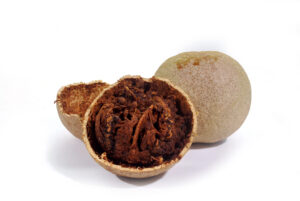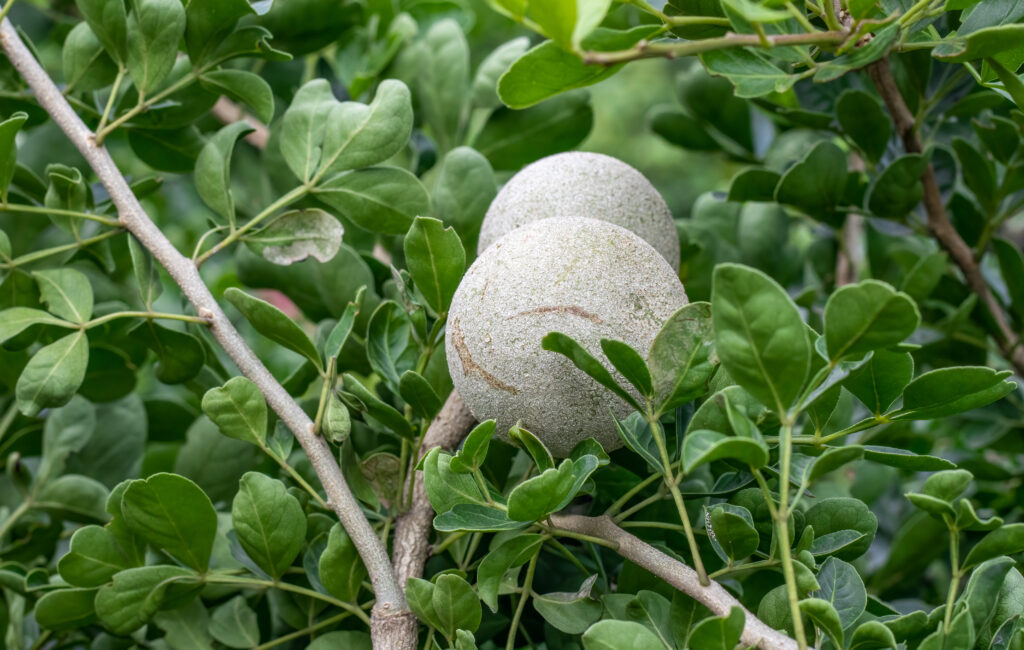Tangy, aromatic, and packed with therapeutic properties — the wood apple (Limonia acidissima) is one of nature’s underrated superfruits. Known by various names like kaitha, belada hannu, or kotha, this tropical fruit is popular in South and Southeast Asia for its unique taste and impressive health benefits.
Though its hard shell may seem intimidating at first, inside lies a soft, brownish pulp that’s rich in nutrients, antioxidants, and natural compounds. Traditionally used in Ayurvedic and folk medicine, wood apple is cherished for its ability to support digestion, cleanse the body, and cool the system — especially in hot summer months.
In this blog, we’ll explore the powerful benefits of wood apple and why this fruit deserves more attention in the world of natural health.
What is Wood Apple?
Wood apple is a unique fruit with a hard, woody shell and a fragrant, fibrous pulp inside. It offers a complex flavor profile that blends sweet, sour, and tangy notes, making it a versatile ingredient in both savory and sweet dishes.
The fruit is typically consumed fresh, juiced, or incorporated into chutneys, jams, and desserts.
Nutritional Value
According to Indian Food Composition Tables (IFCT), the nutritional value of wood apple per 100 grams is as follows:
- Energy: 78.2 kcal
- Protein: 3.14 g
- Fiber: 5.21 g
- Carbohydrate: 7.52 g
- Total Fat: 3.62 g
- Total Sugars: 3.81 g
- Pantothenic Acid (B5): 0.22 mg (4% Daily Value (DV))
- Vitamin B6: 0.17 mg (10% DV)
- Biotin: 1.65 mcg (6% DV)
- Vitamin C: 22.17 mg (25% DV)
- Vitamin K: 6.80 mcg (6% DV)
- Calcium: 55.71 mg (4% DV)
- Copper: 0.20 mg (22% DV)
- Magnesium: 23.70 mg (6% DV)
- Manganese: 0.20 mg (9% DV)
- Potassium: 347 mg (7% DV)
- Selenium: 2.32 mcg (4% DV)
Health Benefits
Wood apples are not just rich in essential vitamins and minerals, it also offers many health advantages.
1. Rich in Antioxidants
Wood apple is packed with antioxidants, compounds that protect the body against oxidative stress and free radical damage. These antioxidants help reduce the risk of chronic diseases such as cancer, cardiovascular diseases, and neurodegenerative disorders.
Wood apple contains antioxidants such as polyphenolics, phytosterols, flavonoids, saponin, tannins, and coumarins, which are responsible for its health promoting properties.
Studies suggests that wood apple had shown high antioxidant activity, which is attributed to its rich content of phenolic compounds.
Including wood apple in your diet can help combat cell damage and keep your body healthy and strong.
2. May Promote Digestive Health
Wood apples are well-known for their effect on digestive issues.
The fruit is rich in fiber, which helps regulate bowel movements, reduces constipation, and promotes the health of the digestive system.
The dietary fiber may also act as prebiotic, which promotes the growth of beneficial gut bacteria by feeding them.
Furthermore, wood apple contains natural laxatives that can reduce stomach-related issues such as indigestion and bloating.
3. May Boost Immunity
Wood apple’s high vitamin C concentration makes it an effective immunity booster.
Vitamin C strengthens the immune system, increases the body’s ability to fight infections and illnesses, and shortens the duration and severity of colds and flu.
Vitamin C boosts immunity by acting as a powerful antioxidant and supporting various immune functions. It strengthens the skin’s barrier against pathogens, enhances white blood cell activity, and aids in microbial killing.
It also supports the function of lymphocytes (white blood cells), helps reduce tissue damage, and aids in preventing and treating infections. A deficiency in vitamin C is linked to weakened immunity and a higher risk of infections.
Regular consumption of wood apple can help strengthen the body’s natural defenses.
4. May Help Manage Blood Sugar Levels
Wood apple has a low glycemic index, which slows the release of sugar into the bloodstream and reducing the risk of rapid spike in blood sugar levels.
Wood apple is rich in fiber, which slows sugar absorption and helps prevent sudden spikes in blood sugar levels. And antioxidants like flavonoids and vitamin C may protect pancreatic cells and improve insulin sensitivity.
It also has anti-inflammatory effects, which may reduce chronic inflammation associated with diabetes.
Animal studies suggest that wood apple may help lower blood sugar levels and improve cholesterol levels. However, more research on humans is needed to confirm these effects.
5. May Prevent Respiratory Diseases
Wood apple contains natural stimulants, may which help loosen and expel mucus from the respiratory tract. This can help relieve congestion in the chest and nasal passages, making breathing easier.
Wood apple is also a good source of antioxidants and anti-inflammatory compounds, such as flavonoids and polyphenols, which can help reduce inflammation in the respiratory tract. This is particularly beneficial for conditions like asthma and bronchitis, where inflammation plays a key role.
Cigarette smoke raises free radicals, leading to oxidative stress and lung inflammation. Kawista fruit, the Indonesian name for wood apple, is rich in antioxidants and may help protect the lungs from this damage.
A study on rats exposed to cigerette smoke found that doses of 0.6 and 0.7 g/kg BW of Kawista fruit reduced lung inflammation and prevented alveolar macrophage activation, inhibiting the increase in their numbers due to cigarette smoke. The 0.7 g/kg BW dose was the most effective.
Regular consumption of wood apple juice or pulp may help not only soothe the throat but also support overall respiratory health.
6. May Reduce Uric Acid Levels
In an animal study, rats were given the ethanolic extract from wood apple at a dose of 200 mg, the extract was effective in blocking URAT1, a protein involved in uric acid regulation. However, a higher dose 400 mg showed kidney toxicity.
The extract’s ability to lower uric acid is likely due to its active compounds, including triterpenoids, phytosterols, and fatty acids.
However, further research on wood apple is needed to find the most effective compound responsible for lowering uric acid levels and inhibiting URAT1.
7. May Have Diuretic Effect
Wood apple may have natural diuretic properties, meaning it may increase urine production and promote the elimination of toxins and waste products from the body through the kidneys.
In Ayurvedic and folk medicine, various parts of the plant (especially the fruit pulp and bark) have been used to promote urine flow and support kidney health. Some studies and ethnomedicinal reports also suggest its mild diuretic action, along with other benefits like anti-inflammatory, antimicrobial, antioxidant, and digestive support.
However, scientific evidence on its diuretic effect is still limited, and more clinical research would be needed to fully confirm its efficacy and safety as a diuretic.
8. May Provide Cooling Effect
Wood apple is traditionally valued for its natural cooling properties, making it a go-to fruit during the hot summer months. It may help hydrate the body and provide relief from heat-related issues like dehydration and heatstroke. In Ayurveda, wood apple is considered a cooling fruit that helps balance excess body heat and maintain internal harmony.
However, studies indicate that wood apple contains around 79% water — less than high-water fruits like watermelon or cucumber.
While it may not be the most hydrating fruit, its combination of water, electrolytes, and soothing nutrients may still offer a moderate cooling benefit, especially when consumed as a refreshing sherbet or juice.
9. May Improve Liver Function
Wood apple is known for its hepatoprotective properties, meaning it helps protect the liver from damage.
Rich in antioxidants like flavonoids and polyphenols, it combats oxidative stress and inflammation, both of which can harm liver cells.
The previously mentioned study also found that wood apple extract helped improve liver function by balancing aspartate aminotransferase (AST) and alanine aminotransferase (ALT) levels. However, more research is needed.
Higher levels of AST and ALT indicate liver damage.
10. May Reduce the Risk of Cancer
Wood apple may help reduce cancer risk due to its rich antioxidant profile, including flavonoids, polyphenols, and vitamin C. These compounds combat oxidative stress and neutralize free radicals, which can damage cells and lead to cancer.
Additionally, wood apple contains phytochemicals with potential anti-cancer properties that may inhibit the growth of cancerous cells.
Its immune-boosting and anti-inflammatory effects further contribute to lowering cancer risk by supporting overall cellular health and reducing chronic inflammation.
Cellular and animal studies suggest that wood apple extract may have anti-cancer effects against breast cancer and Dalton’s Ascitic Lymphoma (DAL). It appears to reduce cancer cells, possibly by activating the immune system and triggering cell lysis.

How to Incorporate Wood Apple into Your Diet
Wood apple can be enjoyed in various ways, making it easy to incorporate into your diet. Here are some simple ideas.
- Raw Fruit: Scoop out the pulp and enjoy it fresh.
- Juice: Blend the pulp with water and a bit of honey for a refreshing drink.
- Smoothies: Add wood apple pulp to your favorite smoothie recipes.
- Chutneys: Use wood apple pulp to make tangy and flavorful chutneys.
- Desserts: Incorporate wood apple pulp into desserts like puddings and ice creams.
Takeaways
Wood apple offers numerous health benefits, from aiding digestion and supporting heart health to regulating blood sugar and strengthening the immune system.
While some claims, like its detoxifying, cooling, and diuretic effects, are based on anecdotal evidence, more scientific research is needed to confirm these benefits.
Whether enjoyed fresh, as juice, or in jam, this exotic fruit is a delicious and nutritious addition to your diet. Embrace the goodness of wood apple and experience its incredible health-boosting properties!
Also read
7 Super Foods That Are High in Vitamin D
7 Amazing Health Benefits of Carrot Juice


